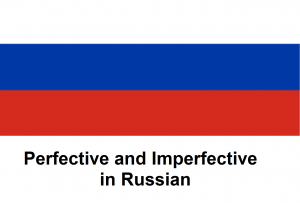Difference between revisions of "Language/Russian/Grammar/Perfective-Imperfective"
m (Quick edit) |
|||
| Line 1: | Line 1: | ||
[[File:Perfective and Imperfective in Russian.png|alt=Perfective and Imperfective in Russian|thumb|Perfective and Imperfective in Russian]] | [[File:Perfective and Imperfective in Russian.png|alt=Perfective and Imperfective in Russian|thumb|Perfective and Imperfective in Russian]] | ||
Hello everybody, | Hello everybody, | ||
| Line 12: | Line 9: | ||
Happy learning! 📚 | Happy learning! 📚 | ||
=='''IMPERFECTIVE ASPECT (Несовершенный вид)'''== | =='''IMPERFECTIVE ASPECT (Несовершенный вид)'''== | ||
The imperfective may be used in all three tenses in Russian: present, past and future. | The imperfective may be used in all three tenses in Russian: present, past and future. | ||
Revision as of 10:53, 29 March 2023
Hello everybody,
In today's lesson, you will learn some useful vocabulary about ¨Perfective Imperfective¨ in Russian. As you dive into the world of Russian grammar, understanding the difference between perfective and imperfective verbs is essential.
Feel free to edit this page by adding new words and expressions! Good learning! 🙂
After mastering this lesson, you can also explore other related topics, such as the Dative Case, Russian Grammar - A vs И, and the Russian cases to further enhance your knowledge of the Russian language.
Happy learning! 📚
IMPERFECTIVE ASPECT (Несовершенный вид)
The imperfective may be used in all three tenses in Russian: present, past and future.
The actions must be seen as a process – incomplete, habitual, repetitive, or in general.
Imperfective verbs also refer to actions that take place simultaneously or where there is an interruption.
When in doubt, or if the result is unclear, the imperfective should be used as the default mode.
.
PERFECTIVE ASPECT (Совершенный вид)
The perfective aspect, by its nature, has only two tenses in Russian: past and future.
Since the present tense is “in progress,” it cannot be completed. Perfective verbs are often used where there was or will be a completed action.
In addition, in questions where the interlocutor specifically asks about an event using the perfective aspect, the same aspect is used in the response.
Author
Other Lessons
- The verb to have
- Tricky Adverbs
- Gender
- Russian cases
- Very important rules
- Personal Pronouns
- Sentense Structure
- Punctuation
- А vs Но
